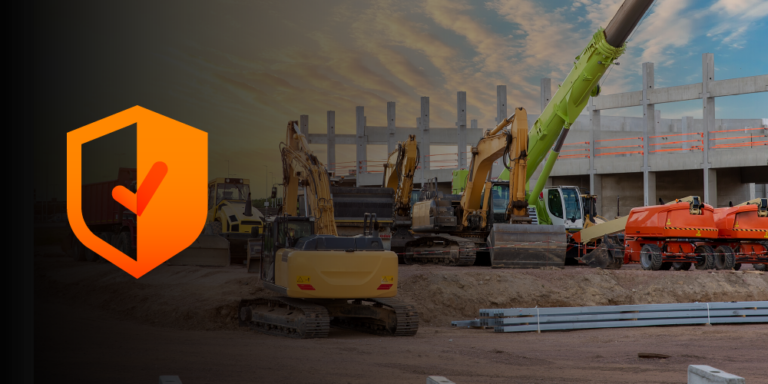— 4 min read
Construction Equipment Rental Insurance: How & Where to Get Coverage

Last Updated Dec 19, 2024

Elizabeth Rivelli
Contributing Writer
12 articles
Elizabeth Rivelli is a freelance writer specializing in insurance and finance. Her writing has been featured in dozens of publications, including Investopedia, The Balance, Forbes, Bankrate, NextAdvisor, and Insurance.com. Elizabeth holds a degree in Communication Studies from Northeastern University. She lives in New England.

Melody Bell
Director of Underwriting
Melody Bell is Director of Underwriting at Procore. Previously, she spent 15 years as Director and Vice President for managing general agents in the U.S. and London, with a focus on construction GL, SDI and professional liability. Melody holds a bachelor's degree from the University of Southern California and a JD from USC Gould School of Law. She lives outside of San Bernadino, CA.
Last Updated Dec 19, 2024

Contractors and construction businesses that rent equipment should consider getting construction equipment rental insurance. This type of insurance covers the cost of replacing rented tools and equipment if they get damaged or stolen.
Learn what construction equipment rental insurance covers, how much it costs and who can benefit from this kind of coverage.
Table of contents
What does construction equipment rental insurance cover?
Construction equipment rental insurance covers tools and equipment that are rented from a rental company. It pays to repair or replace items that get damaged by covered peril, like theft, vandalism and natural disasters.
Most tool rental companies offer insurance as an optional add-on to a rental contract. However, this type of policy can also be purchased separately from an insurance provider. Coverage is available on a short-term basis or as a permanent policy.
It’s important to point out that equipment rental insurance does not cover maintenance issues, misuse, or abuse of the equipment. Any damages caused by lack of maintenance or abuse are the responsibility of the customer.
Equipment Rental Insurance vs. General Liability Insurance
General liability insurance covers damage caused by tools and equipment that a business owns or rents. It doesn’t cover damage to the actual tools or equipment that are rented.
For example, imagine that a residential contractor rents an excavator to build an in-ground hot tub, and they accidentally back the excavator into the side of the house. Not only does it damage a portion of the siding, but it also damages the excavator.
In this case, the contractor’s general liability insurance policy would pay to repair the homeowner’s damaged siding, but it wouldn’t cover damage to the excavator. A construction equipment rental insurance policy would pay to fix the machine.
In addition, some tools and equipment might not qualify for coverage under a general liability policy. For instance, a work truck could be considered business equipment but business-owned and leased vehicles are only covered under commercial auto insurance.
Equipment Rental Insurance vs. Damage Waivers
When a contractor rents construction tools or equipment, they have the option to add a damage waiver to their rental agreement. The damage waiver limits the contractor’s financial responsibility if their rented equipment comes back damaged or stolen.
If something happens to the rented tools or equipment, the customer is only required to pay a certain percentage of the cost of repairing or replacing the items. For example, a waiver might require the customer to pay 50% of the value of stolen equipment.
A construction equipment rental insurance policy covers the full cost of repairing damaged items or replacing stolen equipment, minus any deductibles.
How much does equipment rental insurance cost?
The cost of equipment rental insurance depends on a few factors, including:
- Age of the equipment and its value
- Duration of the rental period
- Type of work being performed
- Deductible and coverage limits
Equipment rental insurance premiums are typically higher for heavy machinery and expensive equipment, like bobcats, cranes and bulldozers. Less valuable tools, like table saws and carpet installation tools, usually have lower premiums.
Additionally, contractors will pay more for rental insurance if they need coverage over multiple months or years. Some insurance companies also offer short-term policies for week-long or month-long projects, which are cheaper.
Considering that construction equipment can be very expensive to rent, the price of insurance is quite inexpensive in comparison. Before purchasing equipment rental insurance, it’s a good idea to shop around and get multiple quotes to find the best policy at the lowest price.
Why do contractors need equipment rental insurance?
Pro Tip
Choosing to purchase a damage waiver instead of a full insurance policy depends on finances of the company and their ability to afford a policy. The policy is more comprehensive in its protection, but the contractor should consult with their broker to determine if utilizing the waiver is prudent or buying a policy would be a better route.
Contractors who rent a lot of equipment have more exposure to risk if they don’t have equipment rental insurance. They are responsible if tools or equipment get damaged or stolen, which can lead to serious financial consequences. Having equipment rental insurance provides peace of mind in case something unexpected happens.
For contractors who rarely rent tools, the coverage offered by a rental company might be sufficient. In this case, a damage waiver could be cheaper than getting a standalone rental equipment insurance policy.
For contractors who rent tools and equipment often, the rental company’s damage waiver may not offer enough protection. A separate equipment rental insurance policy could be a good investment, which covers all the items a business rents during the policy period.
Equipment rental insurance helps protect business assets.
Contractors may want to consider purchasing equipment rental insurance if they frequently rent tools and machinery. The comprehensive coverage provided can safeguard their operations against potential liabilities, and help projects proceed smoothly without the burden of unexpected costs. Shopping around for competitive quotes and consulting with an insurance broker can help contractors secure the best coverage that meets their business needs.
Was this article helpful?
Thank you for your submission.
63%
38%
You voted that this article was . Was this a mistake? If so, change your vote
Scroll less, learn more about construction.
Subscribe to The Blueprint, Procore’s construction newsletter, to get content from industry experts delivered straight to your inbox.
By clicking this button, you agree to our Privacy Notice and Terms of Service.
Thank you!
You’re signed up to receive The Blueprint newsletter from Procore. You can unsubscribe at any time.
Categories:
Written by

Elizabeth Rivelli
Contributing Writer
12 articles
Elizabeth Rivelli is a freelance writer specializing in insurance and finance. Her writing has been featured in dozens of publications, including Investopedia, The Balance, Forbes, Bankrate, NextAdvisor, and Insurance.com. Elizabeth holds a degree in Communication Studies from Northeastern University. She lives in New England.
View profileReviewed by

Melody Bell
Director of Underwriting
Melody Bell is Director of Underwriting at Procore. Previously, she spent 15 years as Director and Vice President for managing general agents in the U.S. and London, with a focus on construction GL, SDI and professional liability. Melody holds a bachelor's degree from the University of Southern California and a JD from USC Gould School of Law. She lives outside of San Bernadino, CA.
View profileExplore more helpful resources

What is Equipment Floater Insurance for Contractors?
Most contractors rely on tools and equipment to complete construction projects. But if something happens to those items, they can be expensive to replace. Contractors can benefit from purchasing an...

Understanding Construction Insurance: Actuarial vs. Underwriting Factors
Determining the price of construction insurance is complex, with much of the work happening behind the scenes. Most construction companies interact primarily with an insurance broker or agent, but actuaries...

Construction Insurance Pricing: What Determines the Cost of Insurance?
Construction is a risky and litigious business, and insurance can help mitigate the risks for builders and owners. Construction insurance is a valuable and frequently required tool, so understanding how...

Self-Insured Retention (SIR) in Construction Insurance Explained
Self-insured retention (SIR) is a mechanism in construction insurance policies that is often compared to a deductible. However, SIRs operate slightly differently and have unique benefits. Understanding how to navigate...
Free Tools
Calculators
Use our calculators to estimate the cost of construction materials for your next project.
Templates
Find a template to help you with your construction project tasks.
Material Price Tracker
Get the latest U.S. retail prices and view historical trends for common building materials.
Glossary
Explore key terms and phrases used in the industry.
